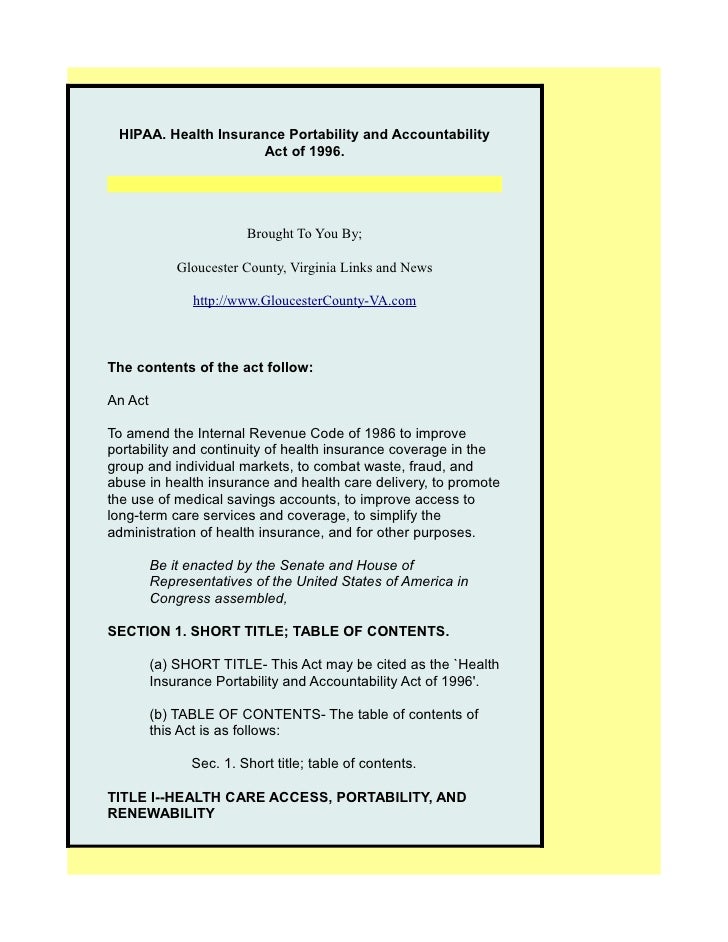Health Insurance Portability And Accountability Act
The health insurance portability and accountability act of 1996 (hipaa), public law 104-191, was enacted on august 21, 1996. sections 261 through 264 of hipaa require the secretary of hhs to publicize standards for the electronic exchange, privacy and security of health information. Hipaa is the acronym for the health insurance portability and accountability act that was passed by congress in 1996. hipaa does the following: provides the ability to transfer and continue health insurance coverage for millions of american workers and their families when they change or lose their jobs;. ‘‘subpart 2—provisions applicable only to health insurance issuers ‘‘sec. 2711. guaranteed availability of coverage for employers in the group market. 42 usc 201 note. health insurance portability and accountability act of 1996. aug. 21, 1996 [h. r. 3103]. The health insurance portability and accountability act of 1996 (hipaa or the kennedy–kassebaum act) was enacted by the 104th united states congress and signed by president bill clinton in 1996. it was created primarily Health Insurance Portability And Accountability Act to modernize the flow of healthcare information, stipulate how personally identifiable information maintained by the healthcare and healthcare insurance industries should be.

Health Insurance Portability And Accountability Act Of 1996
The health insurance portability and accountability act (hipaa) was signed into federal law in 1996 as public law 104-191. one purpose of the law is to protect the portability of health insurance coverage for employees and their families if they change or lose their jobs. this is not discussed in detail here. The health insurance portability and accountability act (hipaa) provides rights and protections for participants and beneficiaries in group health plans. hipaa includes protections for coverage under group health plans that prohibit discrimination against employees and dependents based on their health status; and allow a special opportunity to enroll in a new plan to individuals in certain. The health insurance portability and accountability act (hipaa) is a us healthcare law that establishes requirements for the use, disclosure, and safeguarding of individually identifiable health information. it applies to covered entities — doctors' offices, hospitals, health insurers, and other. The health insurance portability and accountability act (hipaa) was developed in 1996 and became part of the social security act. the primary purpose of the hipaa rules is to protect health care coverage for individuals who lose or change Health Insurance Portability And Accountability Act their jobs. however, hipaa also includes title ii, better known as the administrative simplification act.
Health Insurance Portability And Accountability Act
Introduction. as passed by the united states congress, the health insurance portability and accountability act of 1996 (hipaa) will institute administrative reforms that will be phased in over the period 2000-2003. Health insurance portability and accountability act of 1996. public law 104-191. 104th congress. an act. to amend the internal revenue code of 1986 to improve portability and continuity of health insurance coverage in the group and individual markets, to combat waste, fraud, and abuse in health insurance and health care delivery, to promote the use of medical savings accounts, to improve. The health insurance portability and accountability act of 1996 (hipaa) is a federal law that required the creation of national standards to protect sensitive patient health information from being disclosed without the patient’s consent or knowledge. Introduction. as passed by the united states congress, the health insurance portability and accountability act of 1996 (hipaa) will institute administrative reforms that will be phased in over the period 2000-2003.
Our hipaa history lesson starts on august 21, 1996, when the healthcare insurance portability and accountability act (hipaa) was signed into law, but why was the hipaa act created? hipaa was created to “improve the portability and accountability of health insurance coverage” for employees between jobs. what is hipaa ? title ii of the 1996 health insurance portability and accountability act (hipaa) has broad implications in health care which includes dentistry this law created multiple Health insurance portability and accountability act hipaa: an act created by the u. s congress in 1996 that amends both Health Insurance Portability And Accountability Act the employee retirement income security act (erisa) and the public health.
Health insurance portability and accountability act (hipaa).
Hipaa security rule: the security standards for the protection of electronic protected health information commonly known as the hipaa Health Insurance Portability And Accountability Act security rule, establishes national standards for securing patient data that is stored or transferred electronically. Doh’s hipaa information privacy and security. in 1996, congress passed the health insurance portability and accountability act (hipaa). one component of hipaa was to streamline the process to exchange information and to make health information more readily accessible to patients.
It sales and consulting for greater boston, as well as computer and printer repair center. technical support details, testimonials, and information on health insurance portability and accountability act (hipaa) audit and compliance services included. The health insurance portability and accountability act of 1996 (pl 104-191), also known as hipaa, is a law designed to improve the efficiency and effectiveness of the nation's health care system. hipaa is divided into two parts: title i: health care access, portability, and renewability.
The health insurance portability and accountability act (hipaa) of 1996 is a federal law impacting both consumers and providers of health care services. it does the following: specifies the types of measures required to protect the security and privacy of personally identifiable health care information. The administrative simplification provisions of the health insurance portability and accountability act of 1996 (hipaa, title ii) required the secretary of hhs to publish national standards for the security of electronic protected health information (e-phi), electronic exchange, and the privacy and security of health information.
Belum ada Komentar untuk "Health Insurance Portability And Accountability Act"
Posting Komentar